






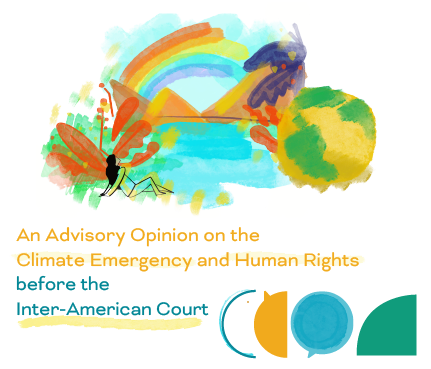
The Advisory Opinion (AO) requested by Colombia and Chile seeks to have the Inter-American Court of Human Rights (I-A Court) clarify the obligations of countries in the region to respond to the climate emergency through the perspective of international human rights law.
Faced with this scenario, the Inter-American Court can encourage States to respond to the climate emergency with solutions based on human rights and science.
The purpose of this site is to serve as a hub for materials and information regarding the AP on the Advisory Opinion, the dialogues generated as a result, and contextual information regarding the request.
The technical and political teams of both countries developed a series of key questions to approach the issue from a human rights perspective that integrates State’s obligations with scientific, environmental, and legal perspectives. This initiative was born CEJIL presenting the issue to Chile and Colombia and their technical request for the establishment of standards regarding this important topic. Likewise, the Advisory Opinion was provided with the technical and political support of the Institute for Governance and Sustainable Development (IGSD).

$57 billion mobilized so far! 📈
— COP28 UAE (@COP28_UAE) December 5, 2023
Governments, businesses, investors and philanthropists have delivered an historical eight pledges and declarations at #COP28 - demonstrating the power of global solidarity 🌎
Together we will #UniteActDeliver pic.twitter.com/hlk8wrzI7f
Upholding human rights can ensure that environmental policy is driven by facts and evidence, not denialism, greed and profit, says United Nations high commissioner for human rights Volker Türk https://t.co/YPfqT3NZAh
— nature (@Nature) November 1, 2023
Call for Comments to the ‘Study on the Impact of Climate Change on Human and Peoples’ Rights in Africa’ https://t.co/hpPoh0DYkN
— African Commission on Human and Peoples' Rights (@achpr_cadhp) October 28, 2023
Climate change is also a health crisis — these 3 graphics explain why
— nature (@Nature) December 4, 2023
Read the full story here: https://t.co/ulJA2q9wkJ#COP28 pic.twitter.com/OiCCqcCOgj
CEJIL and human rights organizations and experts submitted to the IACtHR in the context of the Advisory Opinion on Climate Emergency and Human Rights five Amici Briefs.

The State obligations derived from the duties of preventing and guaranteeing human rights in the face of a climate emergency.
The amicus referred to the obligations of States related to the general duties of prevention and guarantee that have been extensively developed in the jurisprudence of the Inter-American Court of Human Rights (IACtHR). The brief explored the relationship of these principles with international environmental law to give content to state obligations in the face of the climate emergency. It also highlighted the human rights content of principles emerging in environmental law, such as the precautionary principle and the principle of common but differentiated responsibilities and respective capabilities.
The amicus brief was signed by CEJIL in conjunction with Julieta Rossi, Professor at the National University of Lanús and the University of Buenos Aires and Independent Expert of the UN Committee on Economic, Social and Cultural Rights, Rosa Celorio, Burnett Family Associate Dean & Distinguished Lecturer, George Washington University Law School, Reinhold Gallmetzer, Founder & Chairperson Center for Climate Crime Analysis (CCCA), Alexandra Huneeus, Professor of Law, Director of the Global Legal Studies Center, University of Wisconsin-Madison, Claudia Martin, Professorial Lecturer in Residence & Co-Director, Academy on Human Rights & Humanitarian Law, American University, Washington College of Law and Patricia Galvão Ferreira, Associate Professor of Law, Marine & Environmental Law Institute, Dalhousie University.

The right of access to information and obligations on active production of information and transparency in the context of the climate emergency.
The amicus explored the obligations of States in relation to the right of access to information, with broad roots in the Inter-American Human Rights System, on the climate emergency. In particular, it explored the potential of the State’s duty to produce information as a means to guarantee human rights to life, personal integrity, the environment, and health.
The amicus brief was signed by CEJIL in conjunction with Edison Lanza, Ex-Relator for Freedom of Expression of the Inter-American Commission on Human Rights, Non-Resident Senior Fellow, Secretary for International Relations and Institutional Affairs, Canelones Department (Uruguay), the Foundation for Freedom of the Press (FLIP), the Mexican Center for Environmental Law (CEMDA) and Alexandra Huneeus, Professor of Law, Director of the Global Legal Studies Center, University of Wisconsin-Madison.

On the differential obligations of States with respect to the rights of children and new generations in the face of the climate emergency.
The amicus referred to the State’s duties in relation to the rights of children in the face of the climate emergency. It emphasized, for example, the special vulnerability of girls in the face of the climate crisis and the way in which States must respond to it. It also stressed the importance of guaranteeing the exercise of children’s right to participation in the context of climate change. Also referred to the rights of the new generations based on new developments in international law.
The amicus brief was signed by CEJIL in conjunction with the Civil Association DONCEL; the Collective for the Rights of Children and Adolescents of Argentina; the Coordinator for the Rights of Children and Adolescents – CDIA Paraguay; the Emmanuel Foundation; the Alana Institute; the Covacha Development NGO; Plan International; and World’s Youth for Climate Justice – WYCJ.

In relation to the conventional obligations of protection and prevention for environmental and territorial defenders, as well as women, children, adolescents, indigenous peoples, and Afro-descendant communities in the context of the climate emergency.
The amicus emphasized the important role of defenders in the climate crisis, recognizing that they carry out their work under different conditions. To this end, it mentioned the aggressions suffered by defenders fighting against the climate crisis, especially those belonging to indigenous peoples and Afro-descendant communities. In addition, it was pointed out that States should incorporate intersectional considerations to adequately guarantee the rights of defenders, not only by protecting them but also by creating favorable conditions for them to carry out their work.
The amicus brief was signed by CEJIL in conjunction with Amazon Frontlines, Amazon Watch, Asociación Pro Derechos Humanos (Aprodeh), the Center for Climate Crime Analysis, the Centro de Información sobre Empresas y Derechos Humanos, the Mexican Center for Environmental Law (CEMDA), the Colectivo de Abogados y Abogadas José Alvear Restrepo (CAJAR), Colombian Commission of Jurists (CCJ), Consultoría para los Derechos Humanos y el Desplazamiento (CODHES), EarthRights International, Fundación Ecuménica para el Desarrollo y la Paz (FEDEPAZ), Iniciativa Mesoamericana de Mujeres Defensoras de Derechos Humanos (IM-Defensoras), Instituto de Defensa Legal (IDL), International Service for Human Rights, Justiça Global, Instituto Internacional de Derecho y Sociedad (IIDS), Programa Venezolano de Educación Acción en Derechos Humanos (Provea), Protection International, RFK Human Rights (RFKHR), Redress, Unidad de Protección a defensoras y defensores de Derechos Humanos de Guatemala (UDEFEGUA).

On the State’s obligations arising from the consultation and judicial procedures given the climate emergency.
The amicus identified some obstacles that arise in the consultation and judicial procedures related to the climate crisis. Based on this, it referred to key issues that impact the judicial function, such as the assessment of evidence, standing, and precautionary measures given the climate emergency. The contents of this amicus are important due to the increasing use of litigation to demand that States comply with their duties related to climate action.
The amicus was signed by CEJIL in conjunction with Alexandra Huneeus, Director of the Global Legal Studies Center, University of Wisconsin-Madison, the Mexican Center for Environmental Law (CEMDA); Center for Climate Crime Analysis – CCCA; Rosa Celorio – Burnett Family Associate Dean & Distinguished Lecturer, George Washington University Law School and Patricia Galvão Ferreira, Associate Professor of Law, Marine & Environmental Law Institute, Dalhousie University.
The initiative arose from a technical proposal to advance in the establishment of standards on this important issue that CEJIL submitted to Chile and Colombia for their consideration. This Advisory Opinion also had the technical and political support of the Institute for Governance and Sustainable Development (IGSD), which resulted in a series of debates and documents that served as input to the process.
The Advisory Opinion starts by justifying the need and legitimacy of the I-A Court to issue a ruling on the climate emergency and human rights. It follows by providing 6 principal topics referring to the obligations of States when addressing the climate emergency.
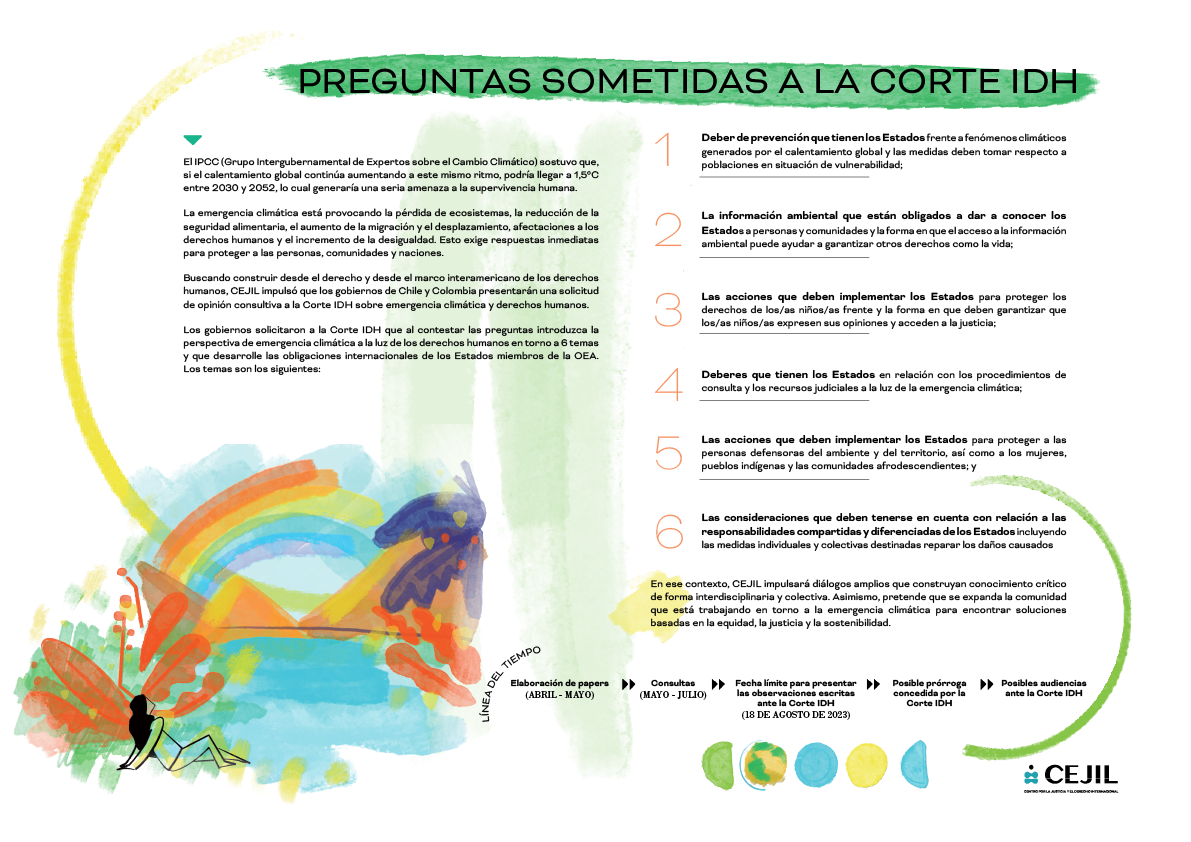

The International Court of Justice will give an opinion on the obligations of States with respect to climate change
At the initiative of Vanuatu, along with another 130 signatory States, a resolution was adopted on March 29, 2023, requesting an Advisory Opinion for the highest judicial tribunal of the UN to issue guidelines on the legal basis for climate justice based on two fundamental aspects: the legal consequences that States must face for their “acts and omissions that have caused significant damage to the climate system and other elements of the environment”, and “the obligations of states under international law to ensure the protection of the system”.
International Tribunal for the Law of the Sea – Hamburg (Germany)
The Commission of Small Island States (Antigua and Barbuda, Nieu, Palau, Saint Lucia, Tuvalu and Vanuatu) requested the International Tribunal for the Law of the Sea for an Advisory Opinion to rule on the obligations of the States belonging to the United Nations Convention on the Law of the Sea regarding climate change. Particularly the States call for a ruling on what measures should be taken to prevent, reduce and control ocean warming, sea level rise, ocean acidification, and to protect the oceans.
European Court of Human Rights (ECHR)
Currently, there are three priority cases under assessment for alleged climate inaction by three governments:
KlimaSeniorinnen v. Switzerland
The case was brought by the association Senior Women for the Climate (KlimaSeniorinnen in German) in which they invoke the harmful effects of climate change on human life and health and demand a more ambitious climate policy from Switzerland, especially in the reduction of greenhouse gases.
Duarte Agostinho v. Portugal and 32 others
A youth group filed a lawsuit against Portugal and 33 other countries alleging the lack of climate policies to reduce greenhouse gas emissions.
The former mayor of Grande-Synthe filed a lawsuit against France on the grounds that the government has failed to comply with its obligation to take sufficient measures to prevent climate change.
United Nations Committee on the Rights of the Child
Sacchi, et al. v. Argentina, et. al.
16 children from 12 countries filed a petition in September 2019, as a form of protest against the lack of action by governments in the face of the climate crisis that undermines children’s rights. Although the petition was declared inadmissible it is considered an important precedent for future cases.
Supreme Court of the Netherlands
With the initiative named Urgenda submitted in 2019, the Supreme Court of the Netherlands became the first national court of the highest level to determine a State’s obligation to significantly and immediately reduce emissions in accordance with human rights obligations.

Uno de los principales temas planteados en la OC es el alcance de los derechos humanos frente a los fenómenos climáticos generados por el calentamiento global, los super contaminantes –como el metano, entre otros–, a la luz de la Convención Americana sobre Derechos Humanos y otros tratados interamericanos.
La Corte podría plantear respuestas de corta e inmediata solución, y también de larga duración. Para llegar a estas respuestas el Tribunal, deberá detenerse en el análisis de los alcances del derecho a un medio ambiente sano y de la naturaleza en el contexto de la emergencia climática, y la manera en que diversos tratados y mecanismos internacionales tales como el Acuerdo de Paris, el Acuerdo de Escazú, el Convenio de Aarhus, convergen ante esta emergencia global.

La OC debería dar lineamiento sobre las consideraciones que deben tenerse en cuenta para garantizar el derecho a defender el medioambiente sano y el territorio en virtud de factores interseccionales e impactos diferenciados, entre otros, sobre pueblos indígenas, comunidades campesinas y personas afrodescendientes, las mujeres, la niñez y generaciones futuras y las personas en movilidad humana forzada.

También se espera que la Corte estudie la forma en que los Estados deben interpretar sus obligaciones de acceso a la información y transparencia activa, así como el derecho a la consulta y participación frente a los diferentes escenarios que produce y podría producir la emergencia climática. Escazú constituye una herramienta clave para esta parte de la Opinión Consultiva, ya que podría aportar criterios para determinar el alcance de la obligación estatal de informar sobre los riesgos de la emergencia climática para personas defensoras, para comunidades amazónicas, costeras u otras especialmente afectadas.

Esa misma línea de análisis podría llevar a la Corte determinar los alcances del derecho de acceso a la justicia y la reparación, como también la información que debe producir y publicar un Estado a fin de determinar la capacidad de investigar diversos delitos cometidos contra personas defensoras, las medidas de debida diligencia que deben adoptarse para asegurar que los ataques y amenazas en contra de las personas defensoras del medio ambiente en el contexto de la emergencia climática no queden en la impunidad. Aquí resultarán sumamente relevantes, los avances y discusiones sobre pérdidas y daños que produce la emergencia climática, ya que podrían brindar luces sobre las reparaciones para las comunidades y ecosistemas afectadas y los principales obstáculos y desafíos que se enfrentan para implementarlas.

Otro importante tema son las obligaciones compartidas frente a la actuación individual y colectiva de los Estados. La Corte IDH ha considerado que la Convención Americana sobre Derechos Humanos CADH crea un “mecanismo de garantía colectiva, en conjunto con las obligaciones internacionales, regionales y universales en la materia” y que “los Estados Parte en la Convención deben colaborar entre sí”. Partiendo de ello, la opinión consultiva sobre emergencia climática, al ser un problema que trasciende lo nacional y regional, representa una gran oportunidad para que el Tribunal ahonde en algunas de las obligaciones compartidas y diferenciada de los Estados frente a la emergencia climática.

En este punto del debate, las reparaciones, la mitigación del daño y la cooperación, vuelven a cobrar un lugar relevante en el análisis para poder alcanzar soluciones más efectivas, equitativas y sustentables. Igualmente, estos desarrollos podrían dar más precisiones para situaciones comunes que requieren soluciones coordinadas entre los Estados, como las afectaciones a países y territorios caribeños, insulares y costeros, o los desafíos de la movilidad humana forzada.
CEJIL participated in the Global Climate change litigation & the rise of international adjudication, organized by the University of Southampton and The Global Network for Human Rights and the Environment. The purpose of this meeting was to learn about current climate litigation in international and regional tribunals such as the request for an Advisory Opinion submitted by the Small Island States Commission on Climate Change and International Law before the International Tribunal for the Law of the Sea. It also included the request by Chile and Colombia to the Inter-American Court of Human Rights (I-A Court) to clarify the involvement of Latin American States in matters of the climate emergency.
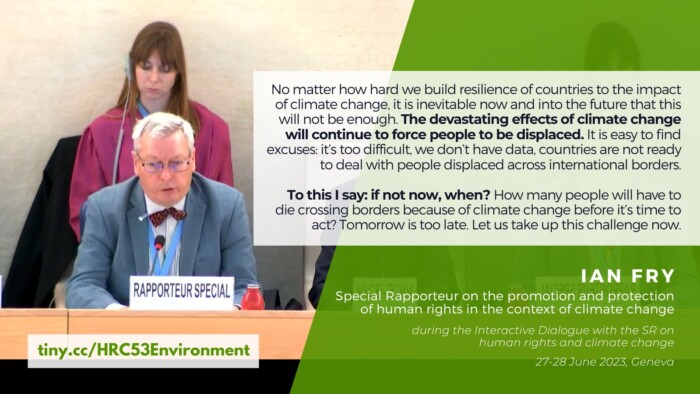
Ian Fry, rapporteur on the promotion and protection of human rights in the context of climate change, participated in the conversation “Human mobility caused by climate change in the Americas”, organized by CEJIL, AIDA, Franciscans International, Amnesty International, and Hispanics in Philanthropy.
Viviana Krsticevic, Executive Director of CEJIL, participated in the Mercosur Social Development Summit, highlighting the importance of addressing climate emergencies with a human rights approach in regional decision-making alliances.
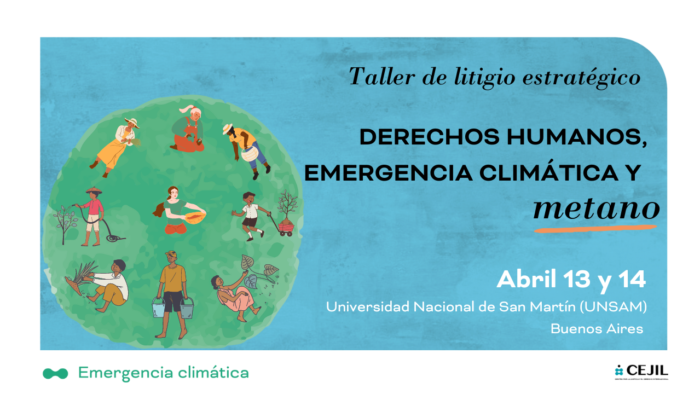
On April 13 and 14, 2023, a workshop was held at the National University of San Marin (UNSAM), Buenos Aires, to discuss strategies and possibilities for climate litigation and human rights standards developments, at regional and domestic level, in cases related to methane emissions. The event included the participationg of legal and climate change specialists from all over the region.
12-hour Interregional Dialogue: Human Rights in the Face of Climate Crisis: A Youth-Led Initiative to Bring Climate Justice to the International Court of Justice, a historic moment organized by World’s Youth for Climate Justice (WYCJ). At this meeting, Viviana Krsticevic, Executive Director of CEJIL, intervened in the 6th session corresponding to Latin America on the topic of “Advisory Opinions and Climate Justice in the Americas” explaining the scope and development of the application before the I-A Court, the need to understand the shared responsibilities in the climate crisis and its challenges for the future of humanity.
“The Courts, Climate Change, Migrant and Refugee Rights” was an webinar organized by the American Society of International Law to discuss how international humanitarian and refugee law should evolve to protect the rights of people displaced by climate change.
Advisory opinions (AO) are authoritative interpretations of the scope of human rights obligations issued by the highest court in the region, the Inter-American Court of Human Rights (I-A Court). Since 1982, the I-A Court has issued 29 AOs that have provided important parameters to ensure the guarantee of fundamental rights. All member states of the Organization of American States (OAS), including those not including in the American Convention on Human Rights (ACHR), as well as other OAS bodies, may submit a petition.
Although AOs do not have the same binding effects as a judgement in a specific case, they can influence the development of international law since they have effects with respect to all member states as the I-A Court is the final interpreter of the ACHR.
This is the second time that a joint AO has been presented to address an issue with national and regional aspects; the first was regarding migrant children.
The I-A Court opened spaces for written participation and will later opened spaces for oral participation. CEJIL has contributed to these spaces by encouraging interested organizations and individuals to participate in providing information and analysis through the submission of Amicus Curiae briefs and the dissemination of the process information.
To join the initiative promoted by CEJIL or receive more information please email us at by [email protected] or follow us on social media.
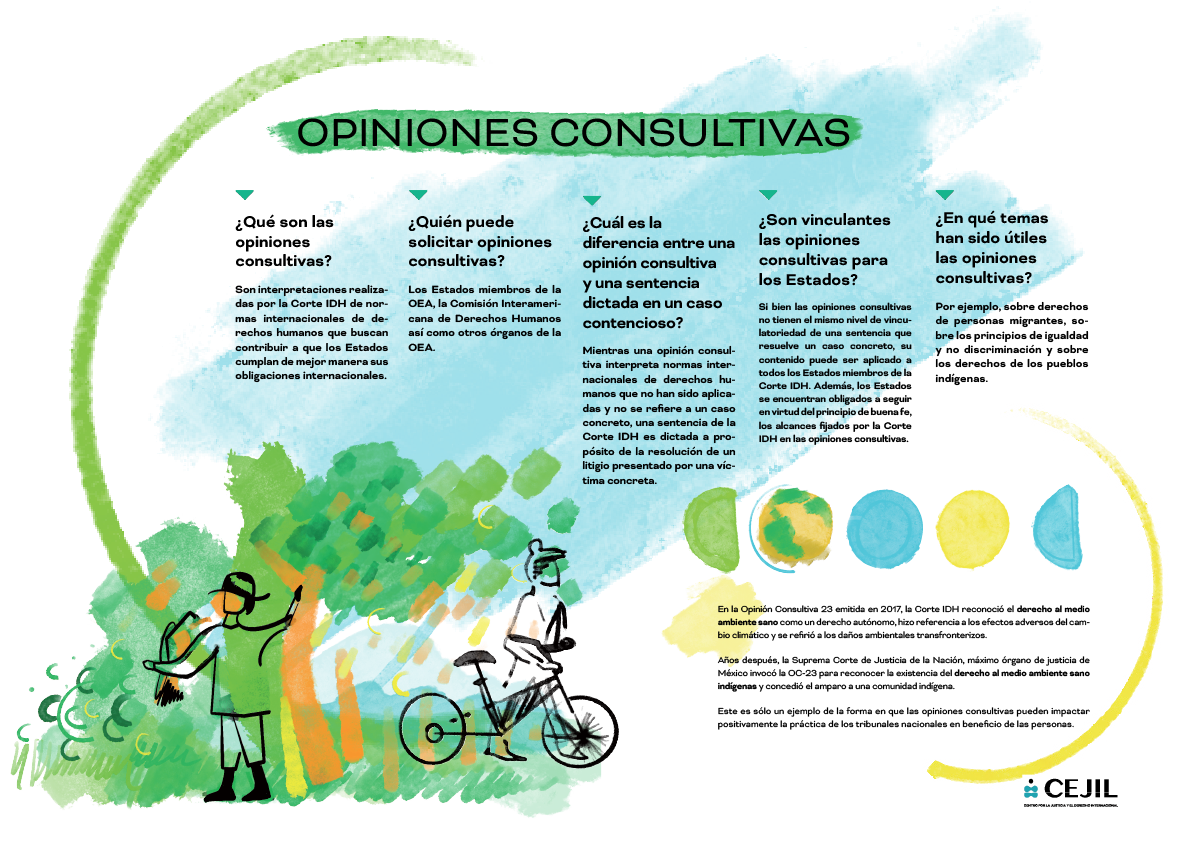
Help us continue this critical and urgent work with a donation!
DONATE NOW